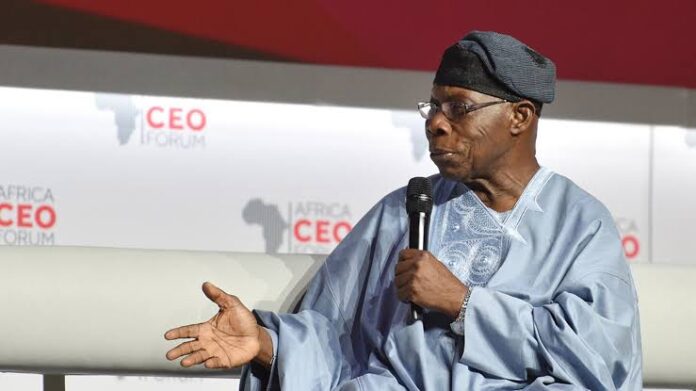Former President Olusegun Obasanjo has called for the dismissal of the Chairman of the Independent National Electoral Commission (INEC), Mahmood Yakubu, along with all electoral officials across federal, state, and local levels.
Obasanjo described the 2023 general elections as a “travesty” and insisted that Nigeria must overhaul its electoral system to restore public trust.
He made this statement in a speech titled “Leadership Failure and State Capture in Nigeria”, delivered at the Chinua Achebe Leadership Forum held at Yale University in the United States.
The former president did not mince words, accusing INEC of deliberately sabotaging the integrity of the 2023 elections.
In his pre-recorded address, Obasanjo argued that the INEC Chairperson and staff must be independent, non-partisan, and incorruptible.
“The INEC Chairperson must not only be absolutely above board but must also be transparently independent and incorruptible,” he stated.
He further recommended shorter tenures for electoral officials to reduce the risk of political interference and corruption.
“Nigeria must ensure the appointment of credible INEC leadership at all levels, with short tenures to prevent undesirable political influence,” Obasanjo emphasized.
Obasanjo criticized INEC for failing to deploy two critical technological tools, the Bimodal Voter Accreditation System (BVAS) and the INEC Election Result Viewing Portal (IReV), during the presidential election.
“These technologies were celebrated for their potential to enhance the transparency of our election results and eliminate rigging,” Obasanjo said.
However, he accused INEC of willfully failing to use these innovations, leading to widespread irregularities.
“In the end, these technologies did not fail. INEC willfully failed to use or implement them. It was a case of inviting the fox into the henhouse,” he added.
INEC has faced mounting criticism since the 2023 general elections, particularly over the failure of the IReV platform during the presidential vote.
INEC blamed the platform’s failure on a technical glitch, but many Nigerians remain unconvinced.
Post-election litigations also centered on the IReV, but these cases were dismissed by both the Presidential Election Petition Tribunal and the Supreme Court.
Observers noted discrepancies in election results, such as the case in Rivers State, where the IReV showed Peter Obi of the Labour Party as the winner, while INEC declared President Bola Tinubu victorious.
While Obasanjo’s criticism has sparked debates, his own record on electoral integrity is far from spotless.
The 2003 and 2007 elections conducted during his presidency were widely condemned as some of the most flawed in Nigeria’s history.
Even the winner of the 2007 presidential election, the late Umaru Musa Yar’Adua, acknowledged the irregularities and initiated electoral reforms.
Goodluck Jonathan, Yar’Adua’s successor, continued these reforms, but experts believe significant work remains undone.
Mahmood Yakubu, appointed by former President Muhammadu Buhari in 2015 and reappointed in 2020, has become a focal point of criticism.
His tenure, set to expire next year, has been marred by controversies surrounding the transparency of elections under his watch.

